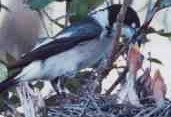Communicating With Wild Birds - Part 3
by Gitie House
Love for one's family and friends, calling out to them for meals, chatting with one's siblings, scolding the big bullies, joining forces to chase enemies, making merry at the pool, calling out long and loud then frantically seeking in one spot after another until every members of one's family is safe at home - sounds so familiar. These are the stuff that makes the ordinary events in a bird's day - much the same as humans.
Realising that a bird's depth of love and consideration is not defined by the size of their physical brain and heart, is key to opening the world of understanding. The heart knows and the birds begin to feel your empathy intuitively. (Pet psychologists talk about shared energy as an important way of communicating with one's dog and are now using it to modify their behaviour.) In much the same way, to a bird you now stop being a disinterested external observer or just a kind and benevolent giver (if you've giving them food and water). You now become someone they can trust, talk to and show their heart's concerns, a friend.
Understanding With Your Heart
Talking and listening to birds will start becoming a reflex process. Whenever you hear a bird, if are able, go out and watch what they are doing? Learn to identify an individual bird by looking for distinguishing features at its feather patterns or shape, size and behaviour. This will help you recognise the bird from a distance and make it easier to figure out which one is doing what. A pair of binoculars also comes in handy here.
Watch their body language change with the different sounds they make. Tone, pitch, repeating patterns all form part of their language. When do they droop their shoulders, shake their necks, squat, cower, stand tall, fluff up and parade, and so on? What kind of personalities have they got? Both the shy and the bold are the easiest to pick. The fussy one can be spotted too. But who are the wanderers, the worriers, the lazy, the cheeky, the annoying, the hard-working, the caring and the gossip?
During mating season, the birds will be preoccupied and have less time to socialise with you. When nestbuilding the mother birds will be very busy and have little time for anything else. Look around the trees, shrubs in the area and they will show you their nests. Find out the borders of their territory. How do they tell other birds of their species, which area is being used by them? Birds whom you may not have yet spoken too, encouraged by your interest will step out of their shells and show you their nests. It's very exciting and yet deeply humbling, when a bird you had paid no attention to calls you from their nest. They've been watching you and waiting for an opportunity to connect. One begins to appreciate the greater web of life and love that exists around us and one's conscious connections with nature deepens.
When is a young adult being asked to leave home? Which direction are they going? Ask the birds. You will be surprised at how much they will show you, once they know that you are concerned and can be trusted as a friend. And suddenly you will discover that they know where their kids are going. They keep in touch with them through various means. When you can recognise their individual voices, personalities, favourite hangouts, you will be able to put the pieces together and get to know a lot more about them than you thought possible.
One of my favourite stories is when Larry the butcherbird invited us to his nest (click here to read the story and view the slideshow). Another favourite is when we rescued a babbler chick, (click here for the full story).
In the next part, we will look at 'Responding To Build Trust', in more detail, as this is the basis for a meaningful communication. For the previous parts click on the links below:
Part 1 Part 2 Part 3 Part 4 Part 5
You can send your questions on any of these steps to editor@wingedhearts.org and I will do my best to answer them.

 del.icio.us
del.icio.us Digg
Digg Facebook
Facebook Google
Google Google+
Google+ LinkedIn
LinkedIn MySpace
MySpace Ping This!
Ping This! SlashDot
SlashDot StumbleUpon
StumbleUpon Twitter
Twitter Yahoo
Yahoo



